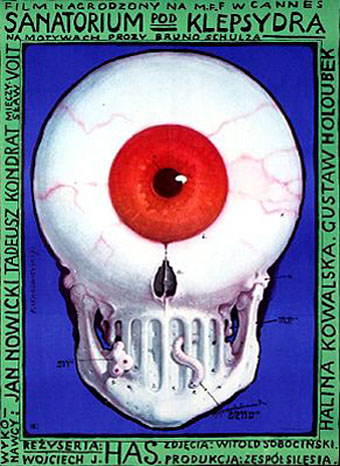
The original Polish poster by the incredible Franciszek Starowieyski.
The shrinking pool of films still unavailable on DVD contracted by at least one title recently with the surprise appearance in the UK of The Hourglass Sanatorium (Sanatorium pod klepsydra; 1973) from the distinctively-named Mr Bongo Films. I’ve been waiting to see this for at least twenty years so being able to walk into Fopp and buy a copy for a mere £12 strikes me as one of those small but rarely acknowledged miracles of contemporary existence.
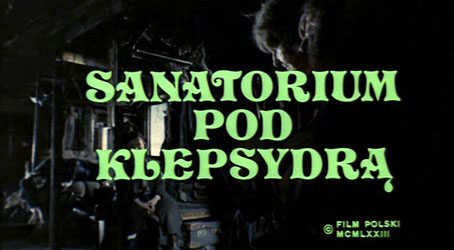
Director Wojciech Has is better known for his long and weird 1965 adaptation of the equally long and weird Saragossa Manuscript, a rambling semi-fantastical novel by Jan Potocki from around 1805. David Lynch described Saragossa as “Simultaneously horrific, erotic and funny…this is one mother of a film,” and the same description could be applied to The Hourglass Sanatorium, as far as I’m aware the only other excursion Has made into full-on strangeness. If anything, Sanatorium outdoes the earlier film on just about every level. Readers familiar with the writings of Bruno Schulz will already have recognised the title as being a truncated variant of Sanatorium Under the Sign of the Hourglass, the second and final collection of Schulz’s unique and very strange stories.
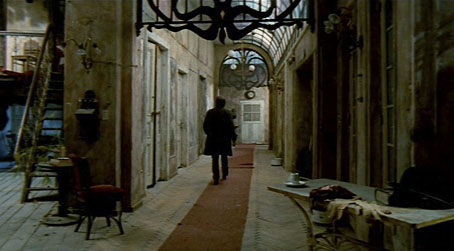
“Very strange” is the key here and Has’s film, like Schulz’s mercurial fiction resists easy summary. Rather than attempt a description myself it’s better to borrow one from the Mr Bongo site:
The film depicts its protagonist, Joseph (Jan Nowicki), traveling through a dream-like world, taking a dilapidated train to visit his dying father in a sanatorium. When he arrives at the hospital, he finds the entire facility is going to ruin and no one seems to be in charge, or even caring for the patients. Time appears to behave in unpredictable ways, reanimating the past in an elaborate artificial caprice. The many occurrences in this visually potent phantasmagoria include Joseph re-entering childhood episodes with his eccentric father (who lives with birds), being arrested by a mysterious unit of soldiers, reflecting on a girl he knew in his boyhood and bringing historic wax figures to life with names from a postage stamp album. Throughout his strange journey, an ominous blind train conductor reappears like a death figure. Has also adds a series of reflections on the Holocaust that were not present in the original novel, reading Schulz’s prose through the prism of the author’s tragic death during World War II and the demise of the world he described.
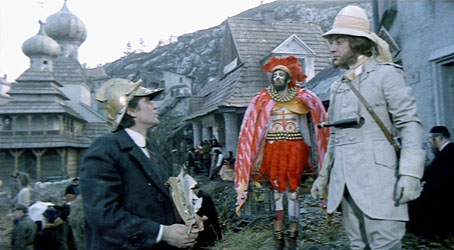
That’s an adequate description of the narrative but how and why one scene links to the next and what it all means is anybody’s guess. This isn’t a complaint; I seek out these unusual works, after all, and we’re overburdened with films whose every last plot detail is spoon-fed to lazy audiences. Schulz readers will at least recognise the territory, especially the recurrent scenes with aged Jews and garment traders, but one has to wonder how this would strike an unprepared viewer. Is Schulz’s work so familiar in Poland that there was a ready audience for this? Or was the director taking advantage of Film Polski’s funding to make something closer to poetry than narrative cinema? Whatever the answer, the film is beautifully lit and photographed, and the continual procession of bizarre scenes and surprising images means that it doesn’t tax your patience even if you remain bewildered much of the time.
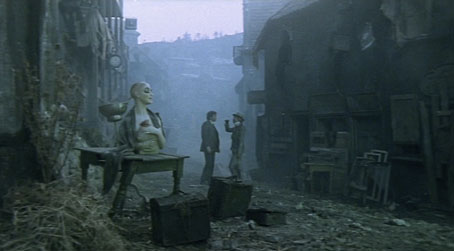
Hourglass Sanatorium is another of those oddities that seems to owe its existence almost solely to the economics of the Iron Curtain countries which (often reluctantly) provided financing for works that the more nakedly commercial “freedom” of the West would never support. This isn’t to say the Communist system was better—Andrei Tarkovsky went into exile and Sergei Paradjanov was put into prison—but its probable that without the Cold War we wouldn’t have had Stalker or Valerie and Her Week of Wonders or a wealth of imaginative animation from Yuri Norstein, Jan Svankmajer, Karel Zeman, Jiri Barta and others. I’m certain we wouldn’t have had Wojciech Has’s unique fantasies. And now I really have to watch this film again.
• Franciszek Starowieyski poster galleries here and here
• The Art of Bruno Schulz
• Saragossa Manuscript film site
Previously on { feuilleton }
• Karel Zeman
• Jan Svankmajer: The Complete Short Films
• The Stalker meme
• The Brothers Quay on DVD
• The Cracow Klezmer Band, John Zorn and Bruno Schulz
• Barta’s Golem

god help me, I had not heard of Wojciech Has before. Now I have. Thank you.
I hope I will have the opportunity to see these movies ! They look great.
John, I have a murky bootleg of another fantastical film by Has – ‘Osobisty pamietnik grzesznika przez niego samego spisany’ (Memoirs of a Sinner) (1986.) Surprisingly it’s an adaptation of a well-known gothic novel, ‘The Confessions of a Justified Sinner’ by the Scottish author, James Hogg.
Has also made a film called ‘The Doll’ which sounds of interest in an East European/Svankmajer way, but my attempts to find a copy have so far proved unsuccessful.
Wait, he made a film of Potocki’s “Manuscript Found in Saragossa” <a href=”http://www.imdb.com/title/tt0059643/”as well?
Doh! My HTML skills are deserting me after a long hard day at the bookface, but, y’know, The Manuscript Found at Saragossa? This is a director of whose work i want to see everything…
Thanks, Michel. I’ve had the book by James Hogg for a while but still haven’t read it. Maybe Mr Bongo will release more of these films.
And yes, David, Has adapted Saragossa very successfully. Really worth seeing not least for an original (and quite restrained) score by Krzysztof Penderecki.